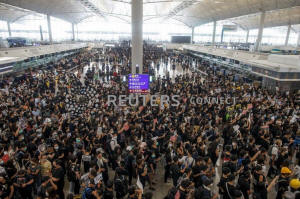Hong Kong airport grinds to a halt as protests swell
 Send a link to a friend
Send a link to a friend
 [August 12, 2019]
HONG KONG (Reuters) - Hong Kong's
airport canceled all flights on Monday, with authorities blaming
demonstrators for the disruption of one of the world's busiest
terminals, a dramatic escalation of anti-government protests that have
roiled the Asian financial hub. [August 12, 2019]
HONG KONG (Reuters) - Hong Kong's
airport canceled all flights on Monday, with authorities blaming
demonstrators for the disruption of one of the world's busiest
terminals, a dramatic escalation of anti-government protests that have
roiled the Asian financial hub.
At the same time a Chinese official in Beijing warned signs of
"terrorism" were emerging. China's People's Armed Police also assembled
in the neighboring city of Shenzhen for exercises, the state-backed
Global Times newspaper said.
Both moves lift the stakes sharply after a weekend of skirmishes between
police and activists, in which both sides appeared to boost their
resolve with new tactics.
Some of the 5,000 activists occupying the airport's arrivals hall for a
fourth day went to the departure area and caused disruptions, Hong Kong
police told a news conference, but declined to say if they would move to
clear the demonstrators.
Traffic to and from the airport was severely affected.
"Airport operations at Hong Kong International Airport have been
seriously disrupted ... all flights have been canceled," the city's
airport authority said in a statement.

"All passengers are advised to leave the terminal buildings as soon as
possible."
Roads to the airport were congested and car parks were full, the
authority said.
The increasingly violent protests have plunged the Chinese-ruled
territory into its most serious crisis in decades, presenting Chinese
leader Xi Jinping with one of his biggest popular challenges since he
came to power in 2012.
Monday's cancellation came as China's Hong Kong and Macau Affairs office
said the city had reached a critical juncture and after police had made
a show of demonstrating a powerful water cannon.
The protests began in opposition to a bill allowing extradition to the
mainland but have widened to highlight other grievances, drawing broad
support.
Over the weekend, as demonstrators threw up barricades across the city,
police shot volleys of tear gas into crowded underground train stations
for the first time, and fired bean-bag rounds at close range.
Scores of protesters were arrested, sometimes after being beaten with
batons and bloodied by police. Police have arrested more than 600 people
since the unrest began more than two months ago.
Tear gas was fired at the blackshirted crowds in districts on Hong Kong
island, Kowloon and the New Territories, with one young female medic
hospitalized after being shot in the right eye, triggering a protest by
medical workers.
"Hong Kong's protesters have been frequently using extremely dangerous
tools to attack the police in recent days, constituting serious crimes
with sprouts of terrorism emerging," said Hong Kong and Macau Affairs
office spokesman Yang Guang.
"Hong Kong has come to a critical juncture. All those who care about
Hong Kong’s future, must firmly come out and say no to all violent
behavior, say no to all violent people."
[to top of second column]
|

Anti-extradition bill protesters rally at the departure hall of Hong
Kong airport in Hong Kong, China August 12, 2019. REUTERS/Thomas
Peter

AIRPORT SIT-IN
At the airport, thousands of activists have occupied the arrivals
hall for days.
Wearing black, the mostly young protesters have chanted slogans "No
rioters, only tyranny!" and "Liberate Hong Kong!" while politely
approaching travelers with flyers describing their demands and
explaining the unrest.
The airport is the world's busiest air cargo port and the 8th
busiest by passenger traffic, says the Airports Council
International (ACI), a global association.
Demonstrators say they are fighting the erosion of the "one country,
two systems" arrangement enshrining some autonomy for Hong Kong when
China took it back from Britain in 1997.
They are demanding the resignation of the city's leader, Carrie Lam,
and an independent investigation into the handling of the protests.
Authorities have called the citywide demonstrations illegal and
dangerous, while highlighting their impact on the already-faltering
economy and residents' daily lives.
Beijing says criminals and agitators are stirring violence,
encouraged by "interfering" foreign powers, including Britain.
China is also putting pressure on big companies, such as Cathay
Pacific Airways <0293.HK>, whose shares tumbled to close to a
10-year low on Monday, after it was told to suspend staff engaged in
illegal protests.
BE WATER OR FACE WATER
Monday's escalation came after police put the water cannon through
its paces, showing it had enough strength to force dummy targets
back at distances of 30 to 40 meters (33 to 44 yards), but drawing a
rebuke from rights group Amnesty International.

"Water cannons are not a toy for the Hong Kong police to deploy as a
sign of strength," Man-kei Tam, the group's Hong Kong director, said
in a statement.
"These are powerful weapons that are inherently indiscriminate and
have the potential of causing serious injury and even death."
As police have dialed up their aggression, protesters have sought to
channel a Bruce Lee maxim: "Be water," employing a flash-mob
strategy to frustrate authorities and stretch their resources.
(Writing by Farah Master and Tom Westbrook; Editing by James Pomfret
and Clarence Fernandez)
[© 2019 Thomson Reuters. All rights
reserved.]
Copyright 2019 Reuters. All rights reserved. This material may not be published,
broadcast, rewritten or redistributed.
Thompson Reuters is solely responsible for this content. |